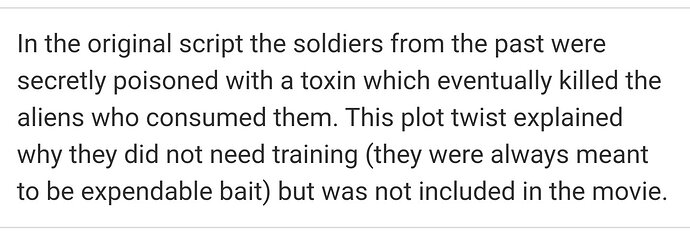In The Earth. If you’ve seen A Field in England, this is one of those again, what seems to be something straightforward descending into a hallucinogenic kaleidoscope of horror. There’s no conventional structure or ending, which is good, but there’s also an odd contrast with several scenes of straightforward horror, including a great scene of attempted mutilation, complete with a squabbling dialogue you’d normally get when someone interferes with mother’s cooking. A really enjoyable film, but Wheatley seems completely unconcerned with giving the viewer any kind of closure on what happened in his films.
Demon Slayer: Mugen Train. Just a long Demon Slayer episode. Fun, great animation, but stuck in an awkward halfway house between doing funny stylised reactions for the lols and doing horror.
Inuyashiki. A ineffectual salaryman gets caught in a fatal accident and receives a new robotic body from aliens, which he uses to do good. Unfortunately, someone else also got a new body, and they’re not good. It’s a kind of “What if Iron Man was a nobody, and also his family hated his guts.” tale, which is entertaining enough.
Seven Samurai. An epic length film of a small battle, virtually no other film has ever been made like this. So much of it is incredible I have to forgive the more basic elements, like the sometimes-nonexistent special effects, or the limitations of the fights which have very little individual choreography. This is largely because it looks to have been nearly impossible to make individual blows look as meaningful as we are used to; this does mean however that you have some very messy melees that look great, and are well choreographed and superbly shot overall. It obviously wasn’t possible to arrange every sword cut when you have twenty extras and several principal actors chasing another group of actors on horses, all wielding spears or swords, but this means you get something that looks more organic. The film is rightfully hailed as a masterpiece. The battle descending into a muddy last stand is an incredible ending. Mifune is the biggest character, but they’re a memorable bunch, especially Shimura as the experienced leader, and Miyaguchi as the skilled swordsman. If it wasn’t 200+ minutes I’d watch it more often.
Agreed on everything you write about Seven Samurai. Every time I watch that movie, I think, “I should watch this every year, what’s my problem?”
Related: As soon as it starts raining in that movie, it somehow ups the tension without really doing anything else for a bit. That’s masterful to me. Have you ever seen a French movie called Brotherhood of the Wolf? It’s fantastic, and one of my favorite movies. It’s not a “masterpiece”, but it is really great, and the opening scene is a brutal fight set in a downpour that is essentially only there to show you what the main characters can do. Because of the rain, it always reminds me of 7S.
Also related: I am often reminded of 7S when I watch Westerns (which isn’t often). I rewatched Rio Bravo last week after not seeing it for…20 years or more, and it is just so good. So much tension in that movie, and one of the rare Westerns that avoids being too heavy-handed (aside from the romance, but that was the era). A lot of people are sort of anti-John Wayne these days, I realize, but he was really pretty talented. He can completely own the screen at times, but also step aside and let other actors fully command their scenes too. Not a lot of stars (or directors I suppose) seem able to do that these days.
Yes, Brotherhood of the Wolf is a genre classic, and an outright good film. The rain in that opening scene makes everything more kinetic, and gives it all more energy even in static shots.
Also, Monica Bellucci.
Army of the Dead. Largely garbage (larbage?). Terrible dialogue, stupid characters, a plan that seems designed not to work, and just leave the actors to struggle with it. Which is a shame, because it has some good parts, but when Tig Notaro plays easily the best character (“Why would I want to know the risks?”) who isn’t even in the film very much, the whole thing struggles under the weight of its nonsense. There’s a taut heist film to be made about robbing a casino vault in a zombie-infested Las Vegas, and this is not it.
Archenemy. A homeless drunk telling tales of being a superhero from another dimension gets the chance to prove he’s not a liar when a local crime boss tries to kill a local reporter, who is documenting his stories for clicks. I wanted to like this, and it has genuine flashes of brilliance. Manganiello is excellent as Max Fist, he brings Old Wolverine-style energy to the role, and has several great scenes, getting drunk and telling stories, snorting meth to feel like he has powers again, but it’s not enough to carry the entire film, which feels quite sparse once its over. It reminds me of Hancock, the superhero film where Will Smith is a homeless drunk with superpowers, except he reforms and the film stops being interesting. Archenemy had a lot more mileage to squeeze out of its story, but perhaps didn’t have the budget; the change from harmless alcoholic to armed vigilante is abrupt, too sudden, and the rest of the film, especially the ending scenes, feels rushed.
All I saw was Monica Bellucci
High-Rise. The great thing about a lot of Ballard’s work is that it’s so far-fetched and at the same time, so plausible, or possible. A brand-new development is quickly filled with professionals, and just as quickly becomes a crucible for chaos and change, as the lower floors rise up in revolt, and the upper floors try to suppress them. Any film that starts with Tom Hiddleston cooking a dog is alright in my book, and Wheatley’s direction and Jump’s writing is as good as always. Not as good as the book, but it never could be.
Whenever people try to explain to me how “great” Snowpiercer is, I just shake my head and say “You should go read High-Rise.” It’s the same thing, but better.
Relic. It’s a nice idea, I suppose, but immediately descends into senile dementia as horror. There isn’t anything I’d recommend here.
Sandcastle. A grunt’s eye view of a COIN effort, from the carefree days of artillery and air strikes in urban areas, to local attempts to restore basic amenities. Quite good, actually, and communicates just how it can alienate just as many people as it draws in. While the overall film is very basic in the ways a lack of money displays, I particularly rate some of the performances and the writing.
The Sound of Metal. At last, a role worthy of Riz Ahmed. A metal drummer begins to lose his hearing, and as a result, his entire life falls apart and must be built up again. The intensity of the loss, the totality of it, is all so well communicated, not least through clever use of audio and silence. The pain is complete, and terrifying in its clarity. I wish I had the talent to communicate what this film is about to the same degree the film speaks to its audience. An awesome achievement. When the time comes, you feel the pain as keenly as the love, and sometimes the love hurts more.
The Tomorrow War. I’ve never seen a film featuring time travel be so uninterested in the ramifications of time travel. It also has a slow motion shot of Chris Pratt shouting “NOOOOOO!”. Unmitigated garbage.

I would actually call Tomorrow War mitigated garbage. The majority of it is a tired retread that is less than than the sum of its parts and keeps wanting emotional catharsis without putting in the work to earn it. It is not concerned about gaping holes in its science or internal logic, either.
All that being said, the last thirty to forty minutes elevated it from atrocious to merely subpar. It felt like the conclusion to a whole other movie, one I wish we had gotten to watch instead.
Magnificent Seven, the recent one. Not very good. Doesn’t compare well to the old one, never mind Seven Samurai. Considering it’s still more than two hours long, there’s hardly any characterisation or depth, little action, and not much else to keep you interested. During the action there’s hardly any continuity of viewpoint and certainly no long takes, there’s no structure to it, it’s just a mish-mash of angles, there’s no large scale shots, and the most worthy scene is probably Chris Pratt carrying out a Wild West style suicide bombing. The casual racism of the two Native American characters using bows is just super cool, it’s not like they enthusiastically adopted firearms or anything. Why does this film exist. Peter Sarsgaard gets to play a pantomime villain. Why do I inflict these things on myself. Why is a Gatling gun treated like some sort of death ray with Parkinson’s disease. Why would a loving God allow films like this to exist. Why is there a completely nonsensical reveal towards the end that makes no difference to anything.
Girlfriend’s Day. Odenkirk gets a good role as a greeting card writer hunting the perfect card and solving a murder in this noir that commits to its silly central idea. Ridiculous but pitch-perfect. Everything from a traditional old school noir is here but jammed into the greeting card industry.


